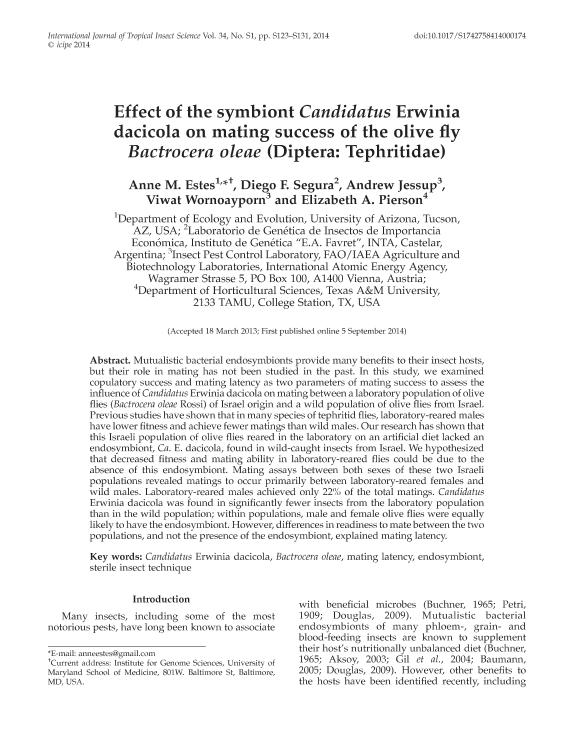Artículo
Effect of the symbiont Candidatus Erwinia dacicola on mating success of the olive fly Bactrocera oleae (Diptera: Tephritidae)
Fecha de publicación:
09/2014
Editorial:
Cambridge University Press
Revista:
International Journal of Tropical Insect Science
ISSN:
1742-7584
Idioma:
Inglés
Tipo de recurso:
Artículo publicado
Clasificación temática:
Resumen
Mutualistic bacterial endosymbionts provide many benefits to their insect hosts, but their role in mating has not been studied in the past. In this study, we examined copulatory success and mating latency as two parameters of mating success to assess the influence of Candidatus Erwinia dacicola on mating between a laboratory population of olive flies (Bactrocera oleae Rossi) of Israel origin and a wild population of olive flies from Israel. Previous studies have shown that in many species of tephritid flies, laboratory-reared males have lower fitness and achieve fewer matings than wild males. Our research has shown that this Israeli population of olive flies reared in the laboratory on an artificial diet lacked an endosymbiont, Ca. E. dacicola, found in wild-caught insects from Israel. We hypothesized that decreased fitness and mating ability in laboratory-reared flies could be due to the absence of this endosymbiont. Mating assays between both sexes of these two Israeli populations revealed matings to occur primarily between laboratory-reared females and wild males. Laboratory-reared males achieved only 22% of the total matings. Candidatus Erwinia dacicola was found in significantly fewer insects from the laboratory population than in the wild population; within populations, male and female olive flies were equally likely to have the endosymbiont. However, differences in readiness to mate between the two populations, and not the presence of the endosymbiont, explained mating latency.
Palabras clave:
Candidatus Erwinia Dacicola
,
Bactrocera Oleae
,
Mating Latency
,
Endosymbiont
Archivos asociados
Licencia
Identificadores
Colecciones
Articulos(SEDE CENTRAL)
Articulos de SEDE CENTRAL
Articulos de SEDE CENTRAL
Citación
Estes, Anne M.; Segura, Diego Fernando; Jessup, Andrew; Wornoayporn, Viwat; Pierson, Elizabeth A.; Effect of the symbiont Candidatus Erwinia dacicola on mating success of the olive fly Bactrocera oleae (Diptera: Tephritidae); Cambridge University Press; International Journal of Tropical Insect Science; 34; S1; 9-2014; 123-131
Compartir
Altmétricas




